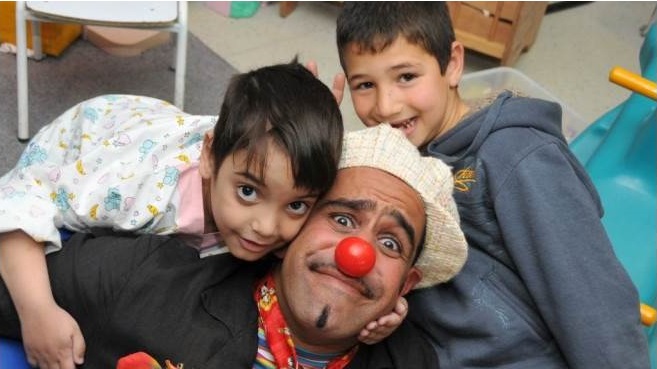
By Peter Kohn, of The Jewish News, Australia
David “DuSH” Barashi and the other therapeutic clowns at Jerusalem’s Hadassah Hospital may be all gags and pratfalls to their young audiences, but hospital officials are more than aware of the important role they play in boosting the morale of child patients.
Most recently Barashi’s wacky humour entertained kids far away from Israel – in the aftermath of Nepal’s earthquake in May. No other country includes medical clowns in its overseas disaster-relief crew. But Israel has blazed a trail in professionalising clown therapy through the Dream Doctors Project, a privately supported program that oversees 110 trained medical clowns working at 29 hospitals across Israel.
Shortly after arriving in Nepal, Barashi was introduced to a young boy with an amputated foot. “My eyes meet his in an unclear look, wondering if I’m just another of the strangers around him? Those smock-wearers, those dressed in uniforms, with those weird objects.
“But then he notices I’m a bit different, a bit strange and unreal. I return his gaze with my mischievous smile. It’s now both of us in a moment that’s as strong as life itself. I approach him slowly, I gesture, he responds with a surprised smile. It’s a world without language, in which everything is clear, without disputes.”
As the boy awaited further surgery, Barashi kept him and his brother entertained with a wheelchair race and squirting water at each other from medical syringes.
Next month, Barashi is visiting Australia to launch a fundraising campaign for Hadassah’s medical-clown program. Launched at the hospital in 2002, today, every major hospital in the country has clowns and the discipline is taught in university.
Hadassah Australia, which is hosting Barashi’s visit, says research clearly demonstrates the efficacy of the program. “Keeping children relaxed during difficult or stressful medical procedures is one aim, but a recent study in Israel found direct medical benefits to patients and cost benefits to the hospital,” said fundraising and relationship development manager Alissa Woolf.
She said benefits include lower stress levels before and after operations, faster operations and quicker discharge from hospital. “Unfortunately, most hospitals in Israel are cash-strapped and can’t afford to pay for these programs from their operating budgets,” she added. “If we don’t find the funds, then the worst-case scenario is that the program at Hadassah will be at risk of closure. That would be a tragedy for the children, their families, and the medical staff.”
Woolf said it has been estimated that three hours of clown work saves approximately $700 in medical and support staff work.
“When you tally up the amount saved over a given year, it represents a huge impact on the financial health of the hospital. Quite clearly, this is no laughing matter and it’s the message we want to spread to potential donors.”
David “DuSH” Barashi, will be in Perth October 7-9, Melbourne October 9-14, and Sydney October 14-18. For more information, visit www.hadassahaustralia.org.
